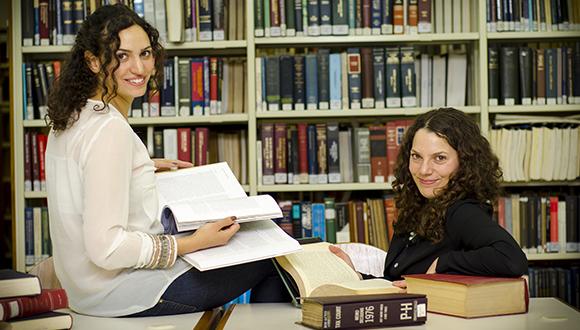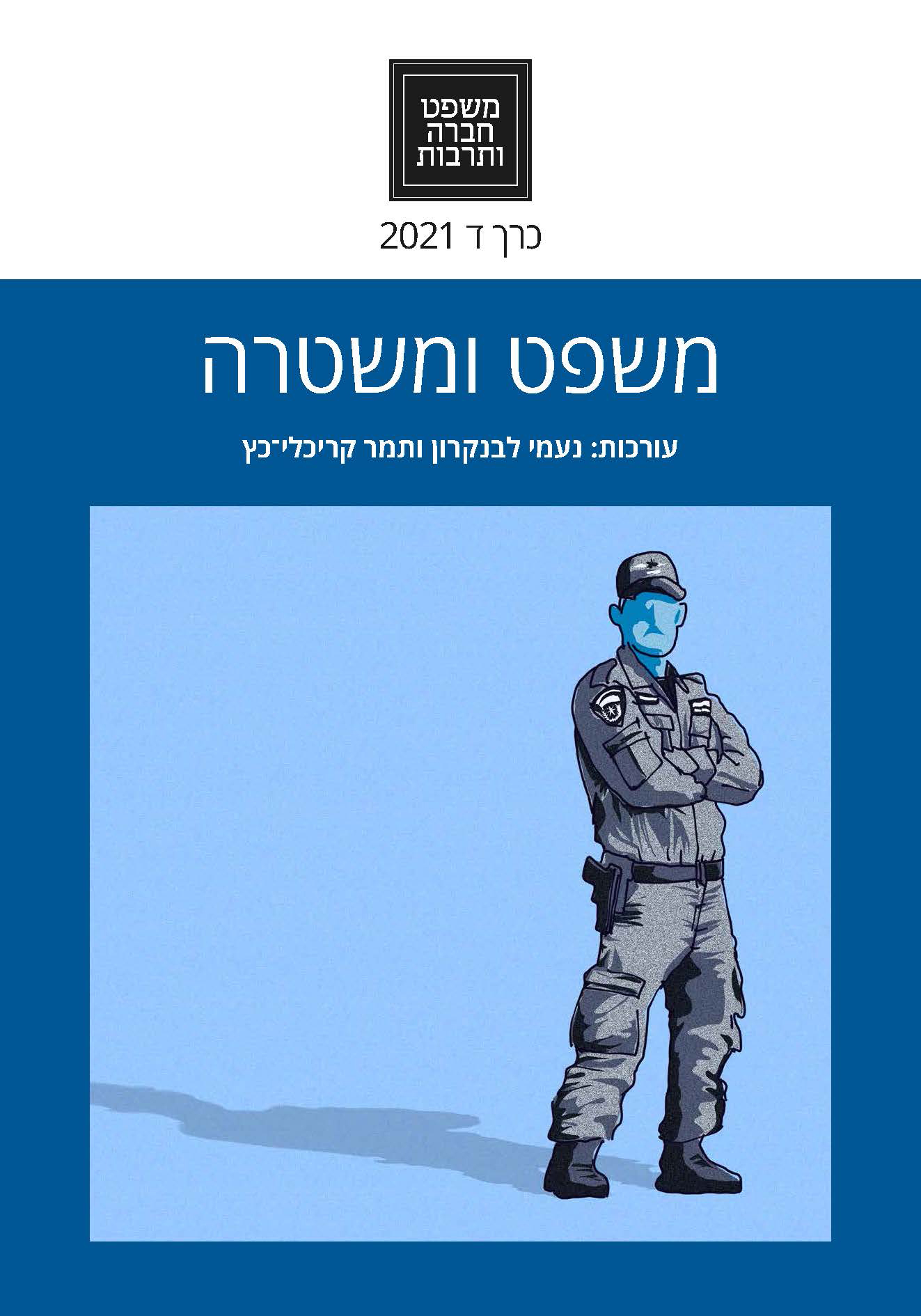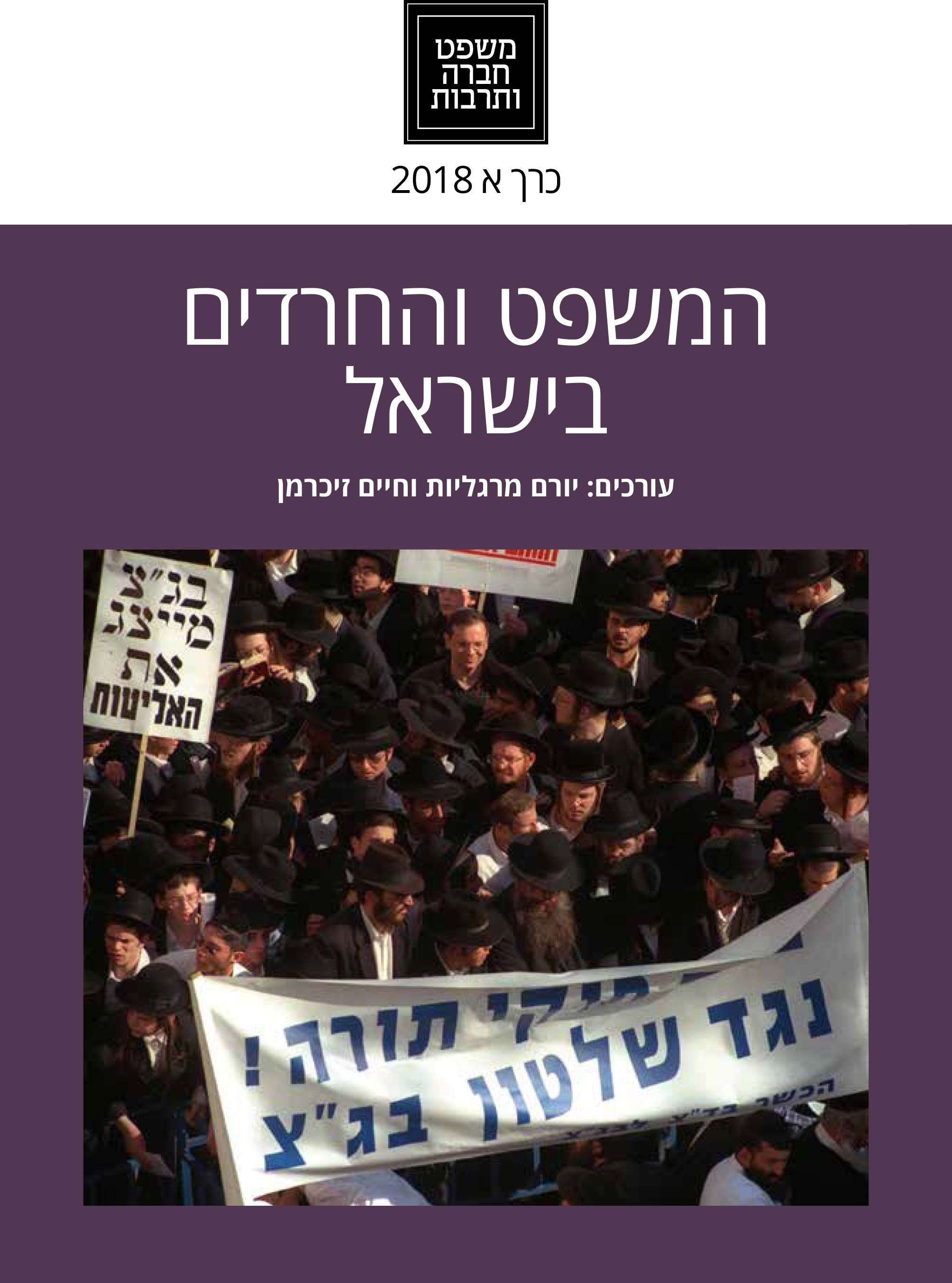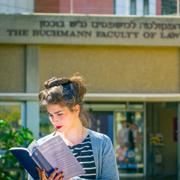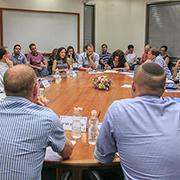Law, Society & Culture

LAW, SOCIETY & CULTURE, Volume 7, 2024
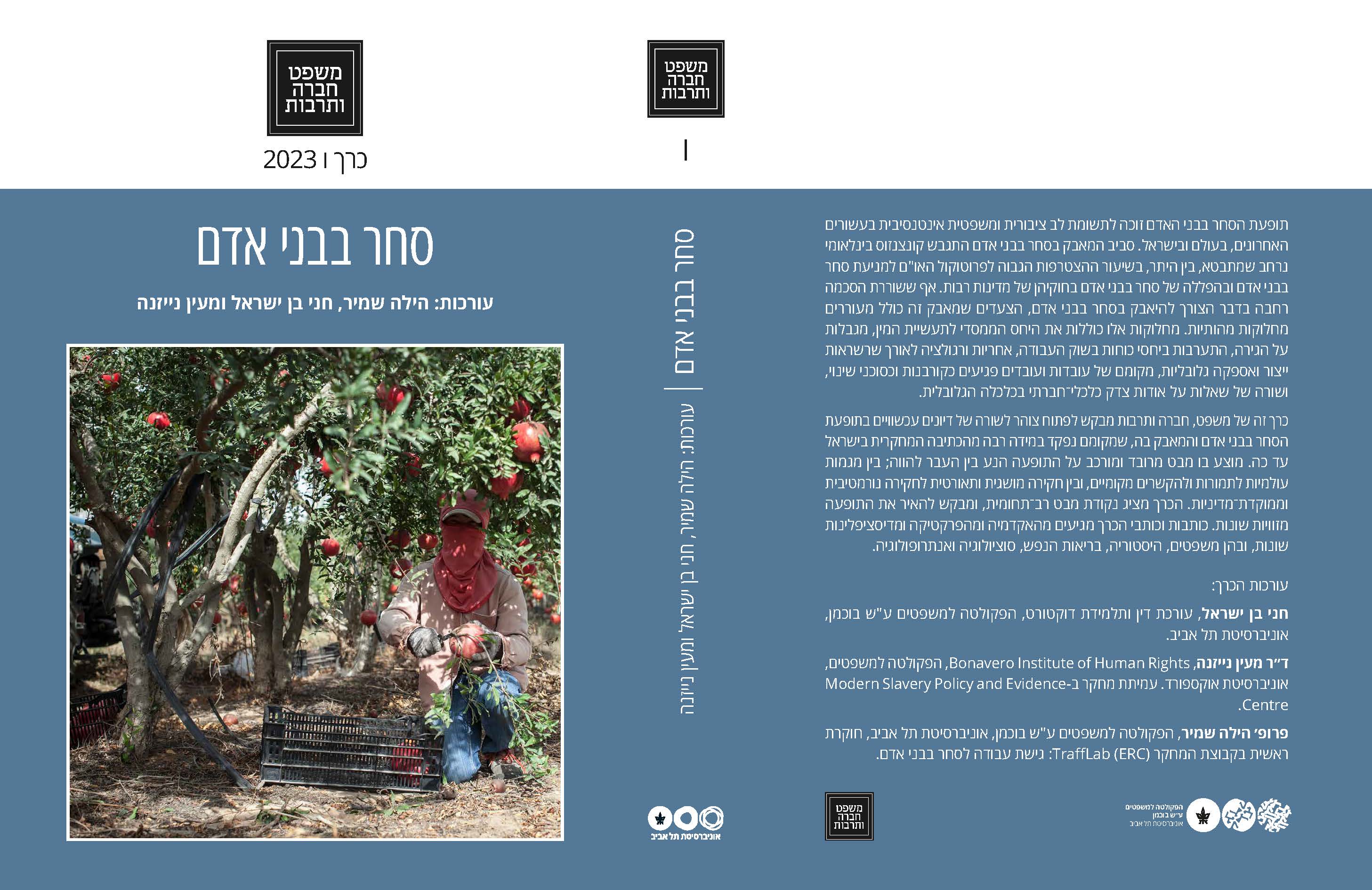
LAW, SOCIETY & CULTURE, Volume 6, 2023
Trafficking in Persons

LAW, SOCIETY & CULTURE, Volume 5, 2022
Law, Economy and Institutions in Israel
The intersection between the realm of law and the realm of economics affects the lives of each and every one of us. The intersection between economics and law includes key issues such as the desired level of regulation, the desired scope of privatization of various types of services and natural resources, the treatment of economic inequality, the roles of the welfare state, and questions of taxation and monetary policy and debt crises. In the past few decades economics departments developed an institutional approach that recognizes the importance of the law to these issues. The law is the basis for the existence of the market, it creates property rights, it enables the creation of contracts and their enforcement, and guarantees the functioning of a competitive marketplace. Law faculties have also considered the interaction of the two fields for some time, partly due to the rise of the economic analysis of law, which analyzes legal rules with economic theories.
This volume deals with the interactions between economics and law from the perspective of the institutional foundation of the marketplace. In spite of the enormous importance of this topic, the historic and contemporary research on it with respect to Israel is small, and especially research in Hebrew. To promote research on Israel in Hebrew, this volume includes a collection of studies dealing with an institutional analysis of economics and law in Israel from both a historical perspective (from the Ottoman period to the present) and contemporary interdisciplinary angles, by a line of leading authors from a variety of disciplines: Law, economics, history, and political science.
LAW, SOCIETY & CULTURE, Volume 4, 2021
The police takes an important role in reflecting and maintaining social and legal norms and distributing power. This volume explores the complex interrelations across the police, society and the law. The papers investigate different aspects of these relations: the relationship between the police and minority groups, the everyday work and experiences of police officers, the history of the Israeli police force and police violence.
LAW, SOCIETY & CULTURE, Volume 3, 2020
Law, so it seems, has grown tired of its own emotional numbness. The age of enlightenment imposed on it an emotional aridity derived from absolute faith in the redeeming value of reason. Pride, hatred, happiness, heartbreak and other human emotions were banished from it to create a fully cerebral normative world. In recent decades, however, there is a growing feeling that this banishment has distanced the law from the entirety of human experience. As it now strives for dominance over other normative systems, there is a growing demand that law should recognize the wholeness of human existence and internalize human emotions. This new stage in the development of law will be as difficult and complex as the human soul itself and fraught with serious risk as well. And yet, it may contribute to the future function of law as the main tool for the creation of a truly just society. In the present volume we have assembled several essays on the various links between law and emotions. Some of them deal with emotions relating to the law as a whole or to its specific branches. Some describe emotional aspects of existing law, and some call for their inclusion in future law – and all have been written from the bottom of the heart.
LAW, SOCIETY & CULTURE, Volume 2, 2019
Privacy, Law and the Surveillance Society
Our privacy today is under unprecedented pressure. Governments seek to collect data in order to prevent terrorism and enforce the law; corporations collect personal data in the name of efficiency and innovation – and for their own business models; the media wish to publish information in the name of freedom of expression and a free press; individuals seek information about other people; and social media encourage us to publish more information, and insist that sharing is caring. These are all legitimate and important interests. Standing in earnest, despite the many eulogies, pressures and criticism, is the right to privacy. As a social norm, we still insist on privacy; as a legal right, privacy is a fundamental human right, enumerated in many international treaties and constitutions, as well as in Israeli law. Each of us needs a private space, and a quiet place where we can ponder, experiment, think and express ourselves, as well as make mistakes, without a disciplining gaze.
The ongoing social negotiation regarding our privacy is one of the salient features of contemporary society. This volume explores some of the privacy issues that lie at the heart of current debates, in light of the rise of the surveillance society. The articles examine theoretical and practical issues, applying legal, social, and political lenses, all intertwined.
LAW, SOCIETY & CULTURE, Volume 1, 2018
Law and the Ultra-Orthodox in Israel
From the inception of the state, the ultra-Orthodox society has had a suspicious and charged relationship with the State of Israel and its institutions. The geographical and cultural segregation has led to alienation between the ultra-Orthodox and the Israeli public. The political coalitions in recent decades and the Israeli parliamentary system often add fuel to the fire of alienation and ignite controversy.
The legal arena is repeatedly required to deal with the most sensitive issues in Israeli society. Issues concerning the recruitment of yeshiva students, gender segregation in the public sphere, religion and state, and collective rights of the ultra-Orthodox minority are often brought before the Supreme Court.
This volume seeks to delve deeper into the complicated relationship between the State of Israel and the ultra-Orthodox society, as it is given expression in the legal world. Aspects related to education, economics, politics and culture are examined by the top academics in their fields.
This volume seeks to present different, sometimes innovative, perspectives on the relationship between the ultra-Orthodox and Israeli law, in the belief that making this content accessible to the Israeli legal community may lead to closer familiarity between the various sectors, thus making a real contribution to the Israeli socialization process.

Justice in the Legal System? Criminal Law and Criminal Procedure in Israel – Problems and Challenges
Editors: Alon Harel, Ayelet Carmeli, Dvir Yogev, Dafni Bar Nathan.
Year of Publication: 2018
Abstract: This book explores crucial themes in the Criminal Justice System in Israel. It addresses policy issues of criminal law and procedure, casting light on these issues through analysis of case studies, the use of interdisciplinary methods and insights drawn from international comparisons.
 Studies In Food Law
Studies In Food Law
Editors: Prof. Aeyal Gross and Dr. Yofi Tirosh, Faculty of Law, Tel Aviv University.
Year of Publication: 2017
Abstract: The book is dedicated to Food Law – a new field of practice which has grown consistently and significantly in recent years and is now being taught at many of the leading law faculties in the world. And yet, little research on the field has been done so far in Israel. The book's contributors, using different disciplines and doctrines, seek to perform for the first time an extensive study on the connection between law, food and public health. Topics discussed include food safety standards and legislation, intellectual property (IP) in the food and agriculture industries (e.g. labeling and marketing of foods, recipe rights, etc.), as well as policies concerning the liability of the fast-food industry with respect to public health claims.
 The Legal Aspects of Jewish-Arab Relations in Israel
The Legal Aspects of Jewish-Arab Relations in Israel
Editors: Dr. Ilan Saban, University of Haifa, Faculty of Law; Dr. Raef Zreik, Minerva Center Fellow, Tel Aviv University.
Year of Publication: 2016
Abstract: The book is dedicated to exploring and analyzing the complex relations between Jews and Arabs in Israel, and in particular with regard to the seemingly dual justice system that exists towards members of each group. The Israeli Arab minority's status as a socially and economically disadvantaged community is evident within many of the country's institutional and non-institutional factions, including the Israeli court system. The book's articles cover a wide range of theoretical disciplines and research fields, including philosophy, history, sociology and political science, and are aimed at addressing various issues relating to Israeli Arabs' legal circumstances, problems and rights.
 The Role of Regulation in Israel
The Role of Regulation in Israel
Editors: Prof. David Levi-Faur, School of Public Policy and the Department of Political Science, the Hebrew University of Jerusalem; Prof. Roy Kreitner, Faculty of Law, Tel Aviv University; Prof. Yishai Blank, Faculty of Law, Tel Aviv University.
Year of Publication: 2016
Abstract: The book provides an exhaustive discussion and analysis into the current regulatory environment in Israel. Its contributors – researchers and scholars of law, sociology, social science, economy and more – present multidisciplinary approaches to the theory and history of regulation, as well as the political and ideological activities of regulatory bodies. Also, several articles in the book examine the importance and scope of regulatory policy in shaping national and state policies.
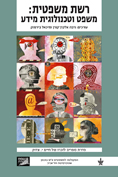 Law on the Web
Law on the Web
Editors: Prof. Niva Elkin Koren, Dean of the University of Haifa Faculty of Law and the founding director of the Haifa Center for Law & Technology (HCLT); Prof. Michael Birnhack, Faculty of Law, Tel Aviv University.
Year of Publication: 2011.
Abstract: The book is dedicated to discussing and evaluating the complex relationship between law and technology in the modern legal landscape. Utilizing theories and perspectives across a wide range of disciplines, the book's contributors present and formulate practices for effectively addressing various technology-related legal aspects relevant to Israel. These include: internet rules and laws, online privacy issues, Intellectual property (IP) rights, portrayal of the legal establishment in mass media and more.
Gated Communities 
Editor: Prof. Amnon Lehavi, Radzyner School of Law.
Year of Publication: 2010.
Abstract: The collection of articles in the book are devoted to discussing the emerging social and economic polarization in Israel. The phenomenon is characterized by a painstaking income inequality between high-income and low-income earners, and the legal and political disparity, as well as real-estate and architecture fluctuations that result from it. This dichotomy has led in recent years to the emergence of Gated Communities: towns, villages, Kibutzim and neighborhoods that are geographically isolated, as well as socially, culturally, ideologically, and even ethnically segregated from their surroundings.
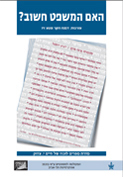
Is law Important?
Editors: Prof. Neta Ziv, Faculty of Law and Women and Gender Studies Program (NCJW), Tel Aviv University, Prof. Daphna Hacker, Faculty of Law, Tel Aviv University.
Year of Publication: 2009.
Abstract: The book contains theoretical and methodological frameworks for the study of the current nature and status of various areas of law in society. Through various disciplines such as Education, Psychology, Sociology, Family Studies, Medicine, Media Arts and more, the book's contributors discuss, examine and carefully analyze the influence and relevance of law to today's political, social and cultural environment.
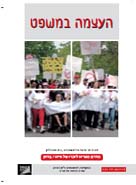 Empowerment on Trial
Empowerment on Trial
Editor: Prof., Hebrew University of Jerusalem, Prof. Guy Mundlak, Faculty of Law, Tel Aviv University.
Year of Publication: 2008.
Abstract: In this book, various researchers of Law, Social Work, Criminology and Sociology conduct a series of case studies on the concept of empowerment and disempowerment in Israel. The socially and culturally diverse case studies consist of members of underprivileged communities, such as Agunot (women who are "chained" to their husbands), discharged soldiers, people with disabilities, residents of development towns, refugees and asylum seekers. The articles also provide an inside look at some of the most pressing public policy issues in Israeli society today. Among these: the Biometric Database Law, marriage, divorce and abortion regulations, human trafficking, sex slavery and more.
 Be Quiet! Someone is Speaking: The Legal Culture of Freedom of Speech
Be Quiet! Someone is Speaking: The Legal Culture of Freedom of Speech
Editor: Prof. Michael Birnhack, Faculty of Law, Tel Aviv University.
Year of Publication: 2008.
Abstract: The book is a collection of articles and testimonials on the status of freedom of speech, and the governmental, economic and social challenges it faces. The book's contributors – distinguished Israeli legal and media scholars - provide an inside look at different types of censorship: copyright infringement, academic freedom vs. academic silencing, as well as press freedom vs. military censorship, and raises questions about their overall legitimacy and effectiveness. In addition, various articles in the book examine the positive and negative impacts of the prevailing suppression of political ideas, art forms and content, both within the political establishment and Israeli society.
.jpg) Trials of Love
Trials of Love
Editor: Prof. Hannah Naveh, Dean of the Faculty of the Art, Tel Aviv University, Prof. Orna Ben-Naftali, The Haim Striks School of Law, College of Management Academic Studies.
Year of Publication: 2005.
Abstract: This book is a series of articles written in response to Paul W. Kahn's Law and Love: The Trials of King Lear, a major contemporary work of social, cultural and legal theory which illuminates the unique interconnection of law and love, as seen from a Judeo-Christian perspective. For generations the ideological, religious and legal forces of society have gone to great lengths to define and control the various manifestations of sexuality, love and acceptable emotional behavior. The many humanists and legal scholars that have contributed to Trials of Love, seek to free this topic from these constrains and present classic works of literature, philosophy and art, in which passion and desire are expressed freely.
.jpg) Technologies of Justice
Technologies of Justice
Editor: Prof. Hannah Naveh, Dean of the Faculty of the Art, Tel Aviv University, Prof. Orna Ben-Naftali, The Haim Striks School of Law, College of Management Academic Studies.
Year of Publication: 2005.
Abstract: This book is devoted to exploring and explaining the unique connection between Law, Science and Society in modern times. Its articles cover a wide range of topics, including the Human Genome Project, freedom of information and the internet, copyrights, trademarks and patents, and scientific proof. In addition, several articles in the book are dedicated to analyzing Israel's particular legal atmosphere, which has evolved considerably in recent years, as result of the country's Hi-Tech Revolution and controversial treatment of human rights.

